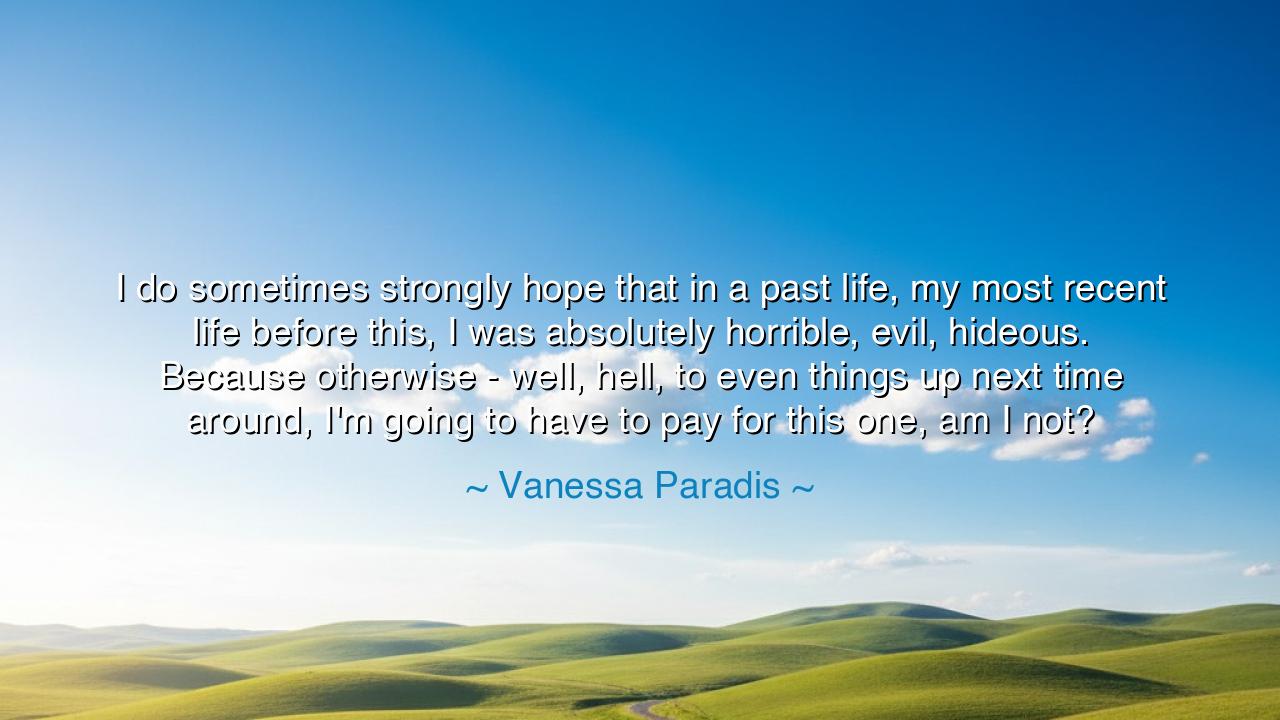
I do sometimes strongly hope that in a past life, my most recent
I do sometimes strongly hope that in a past life, my most recent life before this, I was absolutely horrible, evil, hideous. Because otherwise - well, hell, to even things up next time around, I'm going to have to pay for this one, am I not?






“I do sometimes strongly hope that in a past life, my most recent life before this, I was absolutely horrible, evil, hideous. Because otherwise—well, hell, to even things up next time around, I'm going to have to pay for this one, am I not?” Thus spoke Vanessa Paradis, not in jest, but with the trembling laughter of one who stands beneath the burden of fortune and feels its strange weight. Within her words hides a truth both ironic and ancient—the uneasy balance of karma, the eternal law that binds all souls to the cycles of justice. Her reflection is not vanity, but awareness: that joy too pure, love too abundant, or fortune too kind might one day demand repayment from the scales of existence.
In this confession, there breathes a fear of imbalance, a humility before the mysterious law that governs the cosmos. The ancients of the East called it samsara, the wheel of birth and death, where each deed ripples through eternity. The Greeks called it Nemesis, the goddess who strikes those who rise too high with her winged hand of retribution. And in every age, the wise have whispered that no gift of life comes without its echo, no blessing without its test. Vanessa’s words are not despair but reverence—for she understands that joy and sorrow, virtue and vice, light and shadow, are the two faces of the same divine coin.
Think of the story of King Croesus, whose wealth shone brighter than the sun. He believed himself favored by heaven, until he sought to test his fate. The oracle at Delphi warned him that if he waged war, a great empire would fall. He laughed, believing it would be his enemies. But it was his own. For in the blindness of abundance, he forgot the delicate balance of fate—that what is given by fortune may be reclaimed by time. Vanessa Paradis’ reflection carries that same awareness: when one stands too long in the warmth of grace, one wonders if the chill of consequence waits beyond the dawn.
The meaning of her words lies not in guilt, but in gratitude made humble. She acknowledges that life’s sweetness is not owed but lent, that beauty, love, and success may be the interest on debts unseen. Such thinking belongs to the souls who see beyond the veil of the moment—who sense that existence is not random, but woven by unseen threads of cause and effect. To hope one was once evil is to accept the logic of balance: that one’s present happiness might be the harvest of repentance already sown.
There is, too, a deeper lesson in humility here. When a person believes all their blessings are earned, pride blinds them. But when one believes they might be undeserved—a gift of mercy or atonement—they walk more gently, love more fully, and act with more compassion. The wise do not fear punishment, but disharmony—the breaking of the sacred rhythm between giving and receiving. Thus, Vanessa’s jesting reflection is a moral in disguise: that even in joy, one must remain watchful, thankful, and just.
Remember the tale of Emperor Ashoka, the conqueror of Kalinga. Once, his hands were stained with blood and power. But when he saw the rivers of suffering he had caused, he turned his throne into a seat of peace. His remorse became his redemption, his reign a light of compassion that endured for centuries. Perhaps in one life he was the tyrant, and in the next, the penitent king. So too, Vanessa’s words remind us that our souls may traverse both sides of the moral wheel—that in one life we sin, and in another we heal. Balance, not perfection, is the law of the spirit.
Therefore, the lesson is this: do not cling too tightly to your fortune, nor despair too deeply in your suffering. Both are teachers, both are fleeting. When joy visits you, welcome it with reverence; when sorrow finds you, meet it with patience. The balance of life is not punishment, but purification. To live wisely is to honor both the sunlight and the storm, knowing that each serves the other in the vast design of eternity.
So, my listener, take these words to heart: be humble in joy, and steadfast in pain. When the world gives you more than you deserve, repay it through kindness. When the world seems cruel, answer it with faith. For life is a wheel that turns unceasingly, and what we do in this hour will shape the dawn of the next. Let your deeds, then, be the song that softens your future, the melody that echoes gently through your next becoming. In this way, you may greet every life—not with fear, but with peace, knowing that you have lived in harmony with the eternal law that governs all souls.






AAdministratorAdministrator
Welcome, honored guests. Please leave a comment, we will respond soon